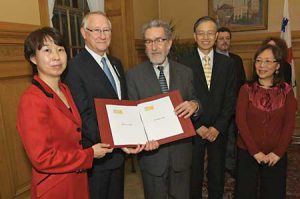
Follows Spanish, Arabic translations; Italian to come
By Chris Chipello
Since Montreal’s Charter of Rights and Responsibilities took effect in 2006, McGill has been instrumental in translating the groundbreaking document into languages other than French and English – making it more accessible to interested cities abroad and to major immigrant communities in Montreal.
After delivering Spanish and Arabic versions of the Charter in the past three years, the School of Continuing Studies presented a Chinese translation to Mayor Gérald Tremblay earlier this month.
“It’s often been said that translation is the language of Europe,” Prof. James Archibald noted in presenting the Chinese text at a Dec. 6 reception in City Hall. “But isn’t it just as much the language of Montreal, this city that welcomes with open arms its residents from all over the world?” Representatives of the City’s Chinese and Greek communities mingled at the event, which also marked the presentation of a Greek translation.
McGill connections
The ongoing collaboration with the City fits neatly with the role of the School of Continuing Studies as an important bridge between McGill and the larger Montreal community.
The Charter has had a link to McGill from the start. Its preamble cites the 1948 Universal Declaration of Human Rights, which was drafted for the United Nations by John Humphrey, a McGill Law professor.
An unusual pact between a municipal government and its citizens, the Montreal Charter has drawn attention internationally, with UNESCO and UN-HABITAT citing it as a means for promoting the “Right to the City” – a concept evoking social inclusiveness, sustainable development, and the right of city dwellers to participate in the management of cities.
Two versions
The idea of producing translations took root about two years after the Charter’s adoption, when an advisor to the City on international relations fielded an inquiry from Argentina about whether the Charter was available in Spanish. It wasn’t. But the advisor happened to be enrolled in Translation Studies at McGill – and the idea of producing a Spanish version turned into an academic project for students in the program, several of whom came from Latin America. When Archibald delivered the Spanish translation in 2009, he floated the possibility of producing an Arabic version, given the rapid growth of Montreal’s Arabic-speaking community. Tremblay embraced the idea. And when the Arabic text was presented in 2010, Tremblay – who was about to leave on a trip to China to meet with an international group of mayors – announced that a Chinese version would follow.
For the Chinese translation, Archibald turned to several collaborators here and abroad, including Dr. Hang Lau, coordinator of the School of Continuing Studies’ Information Technology programs; Ernest Leong, an alumnus of McGill’s Graduate Diploma in Translation program; and Montreal translator and interpreter Isabelle Fu. Ms. Fu handled the task of making the Chinese version available in two variations: the simplified characters used in contemporary mainland China, and the traditional characters used widely in emigrant Chinese communities such as Montreal’s.
So what’s next for the McGill group? At the recent reception, Mayor Tremblay announced that Archibald will take charge of translating the Charter into Italian, ahead of an international meeting slated for Milan. For that job, Archibald will tap into his connections with a research group in communication and political language at the University of Milan, where he was previously a visiting professor.
Meanwhile, back on Sherbrooke St., Archibald’s team is setting to work on another mandate from the City: producing a new and improved English translation of the Charter, to reflect recent revisions to the original French version.
